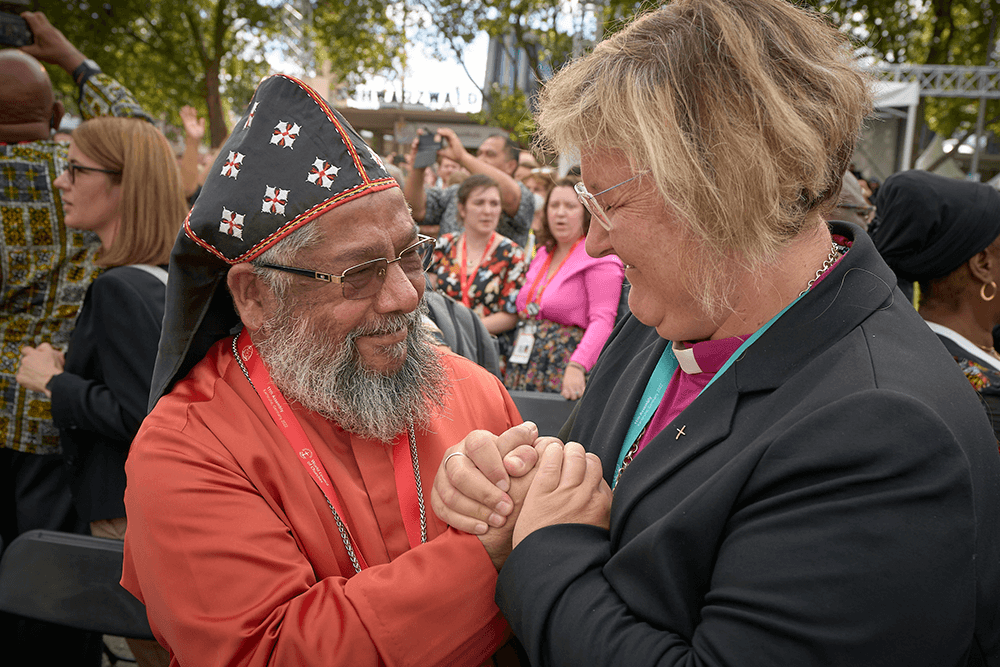
A lengthy line for passport control at the Frankfurt Airport curled around like a coil, slowly inching forward. In the row opposite me, a perplexed man clutching a folder of papers seemed lost, anxiously searching for direction. A simple wooden cross hung from his neck.
I tried to reach out. “Are you going to the WCC Assembly?” He spoke no English and I spoke no Spanish, but I recognized a registration form he was holding. We were both going to Karlsruhe where the 11th Assembly of the World Council of Churches was being held; we could make our way together.
Rev. Santiago de Jesus Rodriguez Lara is a pastor in the Salvadoran Lutheran Church. Using the language of cell phone photos, he introduced me to his father, also a Lutheran pastor, and his family. He showed me a video of a demonstration he led in San Salvador for the rights to clean water for all. By the time our train reached Karlsruhe, Germany, I felt a sense of solidarity and relationship with Santiago and his congregation in El Salvador.
By chance or providence, Santiago and I were booked in the same hotel. Each morning we’d share a non-verbal breakfast and take the tram to the site WCC Assembly, where 574 official delegates and more than 3,000 participants had gathered from every part of the world. Hundreds of times every day — at meals, coffee, registration lines, exhibition booths, committee meetings, weekend excursions, workshops, “home groups,” and worship — participants had opportunities to form relationships and build solidarity across dividing lines of geography, nation, culture, theology, class, gender, and race, like mine with Santiago.
The WCC convenes an assembly only once every eight years. The agenda always includes electing a new, 150-member Central Committee, approving reports and making formal statements on pressing international issues. But that’s not at the heart of what happened in Karlsruhe, nor has it been in the four previous WCC Assemblies I’ve attended.
A WCC Assembly is at its best when it bursts everyone’s bubble. Each participant is invited to view their faith and their own church tradition within the landscape of the whole church in the whole world. The assembly offers those of us who attend the gift of de-centering ourselves in the face of the spirit-infused diversity of the global body of Christ. We heard stories of pain, injustice, and violence from parts of the world never deemed interesting enough to get onto CNN.
For U.S. Christians, the assembly deconstructs the myth of our omnipotence. Whether conservative or liberal, we live within bubbles reinforced by selected media which subconsciously draw the parameters of significance around the boundaries of the nation. We’re tempted to believe our witness and actions are exceptionally consequential. But a WCC assembly bursts that bubble by empowering voices we haven’t heard. In Karlsruhe, I heard from the Māori people from New Zealand, Sámi people from Sweden, and countless more examples of witnesses from the globe’s margins.
This year’s assembly included a powerful example of global re-centering when Rev. Rufus Ositelu was elected as the WCC President for the African Region. He is primate of the Church of the Lord (Prayer Fellowship) Worldwide, which is an “African Instituted Church,” meaning it was founded in Africa by Africans, and not by Westerners or missionaries. Often formed as anti-colonial churches, they were frequently marginalized by Protestant churches and institutions with European roots. While most in the United Staes barely know what an African Instituted Church is, Ositelu’s election is a deeply significant development in the continent which is now the center of world Christianity.
For me, one of the most dramatic examples of global bubble-bursting happened in the life-giving, tear-producing worship. Songs seamlessly flowing into one another from the diversity of global church’s cultures, languages, and liturgical traditions created a worship experience quite literally unlike anything else in the world. A gospel text anchored each day, read and presented in dramatic form, with the Lord’s Prayer said simultaneously in more languages than one could possibly count. For new delegates, confused by business procedures and disoriented by the complex daily schedule, worship grounded, inspired, and connected them to the assembly, as it did for me.
That spirit even flowed at times into plenary sessions. When Brother Alois, prior of the Taizé Community, gave a greeting, he suggested that our search for Christian unity must go “beyond concepts.” Then he called the assembly always so full of words into a time of silence, followed by leading all in singing “ Laudate Omnes Gentes,” a Latin phrase which means “sing praises, all you peoples.” Those moments seemed to bond us together more than anything written on the countless documents the assembly produces.
The assembly’s words, however, do matter, including on issues like the Ukraine War and the Israeli-Palestinian conflict. But throughout the weeklong assembly, the call for climate justice came from every region of the church, and every Christian tradition. Youth delegates at Karlsruhe reinforced this with indefatigable persistence. “You say we are the future,” one youth delegate told the assembly, “But our future is on fire.” The assembly instructed its 352 member churches, and all who will listen, to advocate for a series of necessarily radical steps, including the end to any new development of fossil fuels.
When closing worship ended the Karlsruhe Assembly, I received a WhatsApp message from Santiago wanting to meet before he left. At our last meeting, he used gesture, symbols, and a few words I grasped to share that his father had made the small wooden cross he wore. But now, he wanted me to have it. That has become my most precious memory of Karlsruhe.

